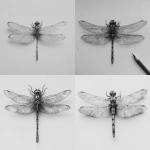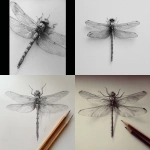Explore the Best AI Image Gallery

The Algorithms Lens: AI in Product Photography
Product photography has always been a crucial element of e-commerce, influencing purchasing decisions and shaping brand perception. Today, artificial intelligence (AI) is stepping into the spotlight, revolutionizing this field with its ability to automate tasks, enhance image quality, and unlock creative possibilities. From generating stunning visuals to personalizing product presentations, AI is reshaping the landscape of product photography.
The Rise of AI in Product Photography
Several AI-powered tools are already making waves in the industry:
- Image Generation: AI algorithms can create realistic product images from scratch, eliminating the need for physical shoots and offering a cost-effective alternative. These models learn from vast datasets of existing images, enabling them to generate diverse and visually appealing product representations.
- Style Transfer: This technique allows brands to apply different artistic styles to their product photos, creating unique and eye-catching visuals that resonate with specific target audiences. AI can analyze the desired style and seamlessly transfer it onto product images, adding a touch of creativity and individuality.
- Background Removal and Editing: AI-powered tools can automatically remove backgrounds from product images, saving photographers time and effort. They can also enhance image details, adjust lighting conditions, and perform other edits to achieve professional-looking results.
- 3D Product Visualization: AI is enabling the creation of interactive 3D models of products, allowing customers to explore them from all angles and zoom in on specific details. This immersive experience enhances product understanding and can significantly influence purchasing decisions.
The Impact on the Creative Industry
AIs influence on product photography is reshaping the creative landscape in several ways:
- New Opportunities for Artists and Designers: AI tools can augment the creative process, allowing artists and designers to focus on conceptualizing ideas and developing unique styles. They can leverage AI to generate variations, explore different concepts, and refine their designs more efficiently.
- Democratization of Photography: AI-powered tools are making professional-quality product photography accessible to businesses of all sizes, leveling the playing field and empowering small enterprises to compete with larger brands.
- Increased Efficiency and Cost Savings: By automating tasks and streamlining workflows, AI can significantly reduce the time and cost associated with product photography. This frees up resources for other creative endeavors and allows businesses to focus on strategic initiatives.
Ethical Considerations
While AI offers immense potential, it also raises ethical concerns that need careful consideration:
- Bias and Representation: AI algorithms are trained on existing datasets, which may contain biases that reflect societal inequalities. Its crucial to ensure that AI-generated images are diverse and representative of different cultures, ethnicities, and body types.
- Transparency and Accountability: The decision-making processes of AI algorithms can be opaque, making it difficult to understand how images are generated. Increasing transparency and accountability is essential to build trust and ensure responsible use of AI in product photography.
- Copyright and Intellectual Property: The ownership of AI-generated images raises complex legal questions. Its important to establish clear guidelines and regulations regarding copyright and intellectual property rights in the context of AI-powered creativity.
Future Trends
The future of AI in product photography is brimming with possibilities:
- Hyper-Personalization: AI will enable brands to create highly personalized product presentations tailored to individual customer preferences, enhancing engagement and driving sales.
- Augmented Reality (AR) Integration: AI-powered AR experiences will allow customers to virtually try on products, visualize them in their homes, and interact with them in immersive ways, revolutionizing the online shopping experience.
- Sustainability and Ethical Practices: AI will play a crucial role in promoting sustainable practices within product photography by reducing waste, minimizing resource consumption, and ensuring ethical sourcing of materials.
Conclusion
AI is transforming the world of product photography, offering unprecedented opportunities for creativity, efficiency, and personalization. As this technology continues to evolve, it will undoubtedly shape the future of e-commerce, blurring the lines between the physical and digital realms and creating immersive shopping experiences that captivate consumers worldwide.

](https://images.ai-img.art/thumbnails/150/229d202f0ba192ad857509389a22aa5e3b948a813ee711996ae9d32631b486e0.webp)




](https://images.ai-img.art/thumbnails/150/7c569b0eb6e7eddaf8d96b3e3532d8b0de6a7d79916c0ef333632070a3085997.webp)


](https://images.ai-img.art/thumbnails/150/76d26b409b1a7acfd86a78c5d5047ff9bd7be9ecf55ce838cc2c854bf42c00be.webp)






](https://images.ai-img.art/thumbnails/150/546184a0cbf4b3d07f6ce10e72c0faf2a088fd4aac33c10422c11d76bf734be8.webp)
](https://images.ai-img.art/thumbnails/150/f401da92914cabe9929e88ee4a02fbe744702d0c12dcbbd71efa8cf4cf1a6fee.webp)




](https://images.ai-img.art/thumbnails/150/c064d275c74e06a80b37064ffe83a30913361f0a4602f9a669e8ecbdb37ec6ad.webp)





](https://images.ai-img.art/thumbnails/150/5d3ed451a35bec12705494605ebbe909dc0f4319e9a6064ab824b39609ada54e.webp)

](https://images.ai-img.art/thumbnails/150/912c326dfe63108e4ca5cdcf408c2247b3e7d4afacde8aac324b06a9a4a6913c.webp)




](https://images.ai-img.art/thumbnails/150/8561b450506900783584c556bf57ccab16188eb111ae0b9ec0cc34841b9a6825.webp)
](https://images.ai-img.art/thumbnails/150/fe2cfa6e64066976325cd677ef63e43820c1843dc81bcf90c0b68dc300689e03.webp)




](https://images.ai-img.art/thumbnails/150/e3a2739669e7e25395e2cc5578f479057e60973d76d85724a5758b6e1039ee3c.webp)






](https://images.ai-img.art/thumbnails/150/2055d76bd9940ffa62a06896525d0f07a5b57bbe3b766a043d977b1c678d69c1.webp)
